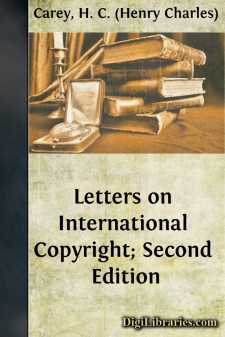Categories
- Antiques & Collectibles 13
- Architecture 36
- Art 48
- Bibles 22
- Biography & Autobiography 813
- Body, Mind & Spirit 142
- Business & Economics 28
- Children's Books 17
- Children's Fiction 14
- Computers 4
- Cooking 94
- Crafts & Hobbies 4
- Drama 346
- Education 46
- Family & Relationships 57
- Fiction 11829
- Games 19
- Gardening 17
- Health & Fitness 34
- History 1377
- House & Home 1
- Humor 147
- Juvenile Fiction 1873
- Juvenile Nonfiction 202
- Language Arts & Disciplines 88
- Law 16
- Literary Collections 686
- Literary Criticism 179
- Mathematics 13
- Medical 41
- Music 40
- Nature 179
- Non-Classifiable 1768
- Performing Arts 7
- Periodicals 1453
- Philosophy 64
- Photography 2
- Poetry 896
- Political Science 203
- Psychology 42
- Reference 154
- Religion 513
- Science 126
- Self-Help 84
- Social Science 81
- Sports & Recreation 34
- Study Aids 3
- Technology & Engineering 59
- Transportation 23
- Travel 463
- True Crime 29
Letters on International Copyright; Second Edition
Categories:
Description:
Excerpt
LETTER I.
Dear Sir:—You ask for information calculated to enable you to act understandingly in reference to the international copyright treaty now awaiting the action of the Senate. The subject is an important one, more so, as I think, than is commonly supposed, and being very glad to see that it is now occupying your attention, it will afford me much pleasure to comply, as far as in my power, with your request.
Independently of the principle involved, it seems to me that the course now proposed to be pursued is liable to very grave objection. It is an attempt to substitute the action of the Executive for that of the Legislature, and in a case in which the latter is fully competent to do the work. For almost twenty years, Congress has been besieged with applications on the subject, but without effect. Senate Committees have reported in favor of the measure, but the lower House, composed of the direct representatives of the people, has remained unmoved. In despair of succeeding under any of the ordinary forms of proceeding, its friends have invoked the legislation of the Executive power, and the result is seen in the fact, that the Senate, as a branch of the Executive, is now called upon to sanction a law, in the enactment of which the House of Representatives could not be induced to unite. This may be, and doubtless is, in accordance with the letter of the Constitution, but it is so decidedly in opposition to its spirit that, even were there no other objection, the treaty should be rejected. That, however, is but the smallest of the objections to it.
If the people required such a law, nothing could be more easy than to act in this case as we have done before in similar ones. When we desired to arrange for reciprocity in relation to navigation, we fixed the terms, and declared that all the other nations of the earth might accede to them if they would. No treaty was needed, and we therefore became bound to no one. It was in our power to repeal the law when we chose. So, again, in regard to patents. Foreigners exercise the power of patenting their inventions, but they do so under a law that is liable to repeal at the pleasure of Congress. In both of these cases, the bills underwent public discussion, and the people that were to be subjected to the law, saw, and understood, and amended the bills before they became laws. Contrast, I beg of you, this course of proceeding with the one now proposed to be pursued in reference to one of the largest branches of our internal trade. Finding that no bill that could be prepared could stand the ordeal of public discussion, a treaty has been negotiated, the terms of which seem to be known to none but the negotiators, and that treaty has been sent to your House of Congress, there to be discussed in secret session by a number of gentlemen, most of whom have given little attention to the general principle involved, while not even a single one can be supposed qualified to judge of the practical working of the provisions by whose aid the principle is to be carried out....



